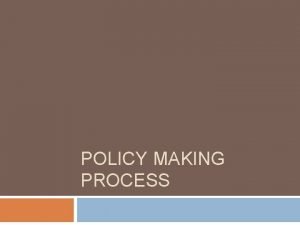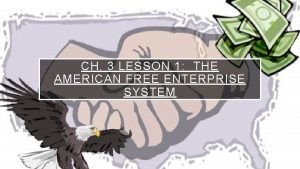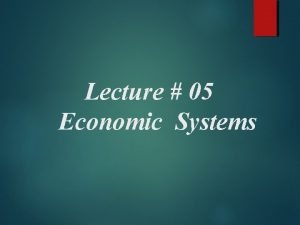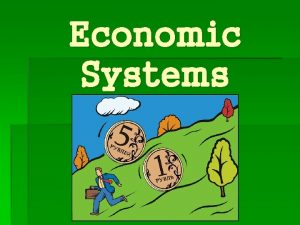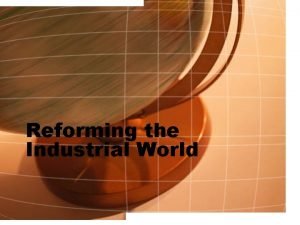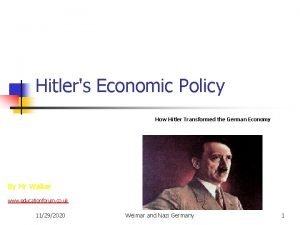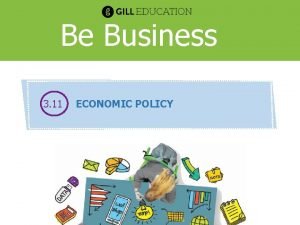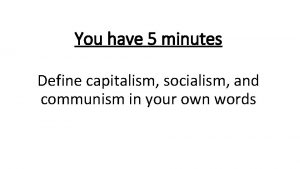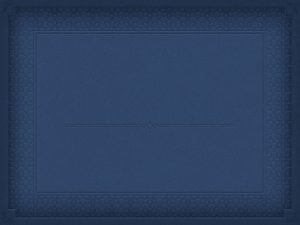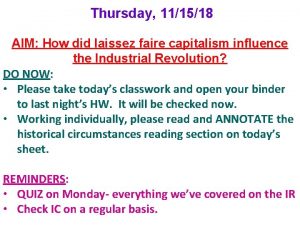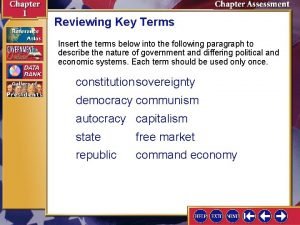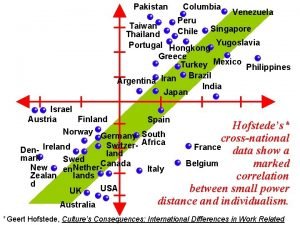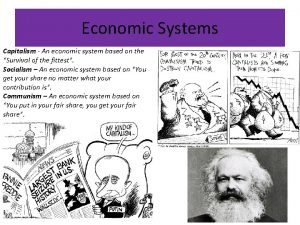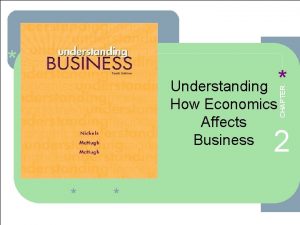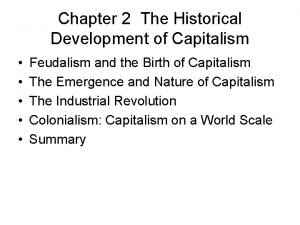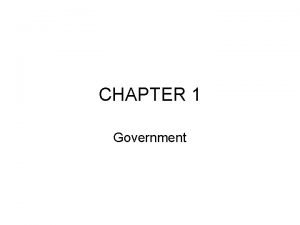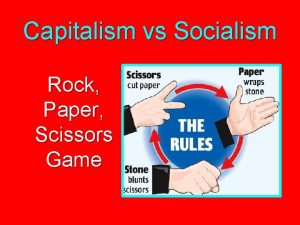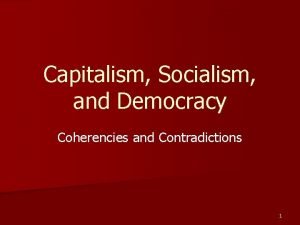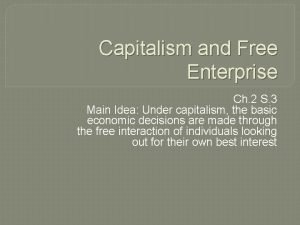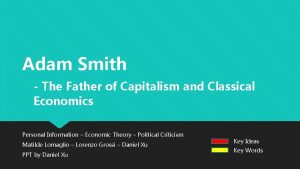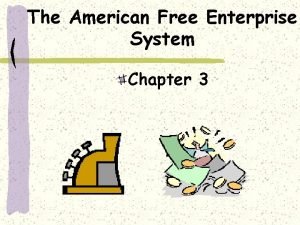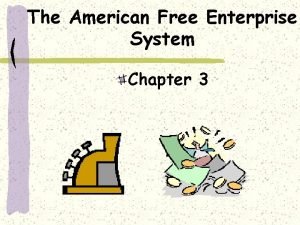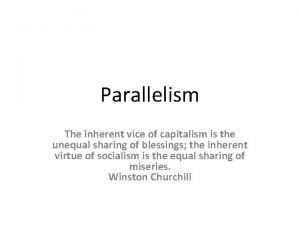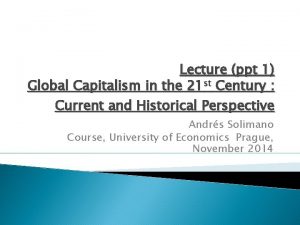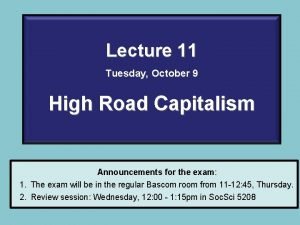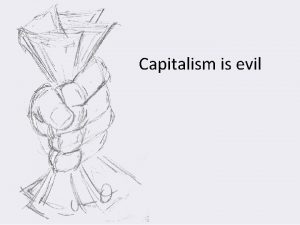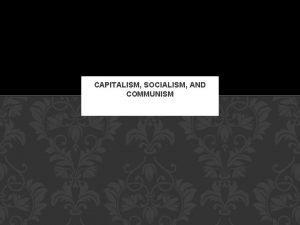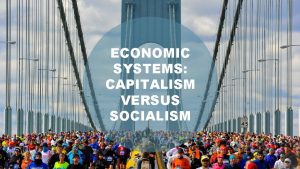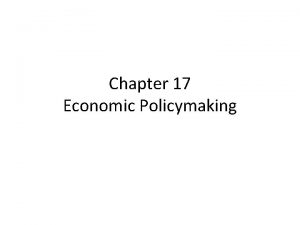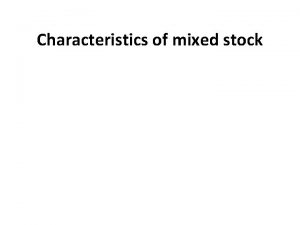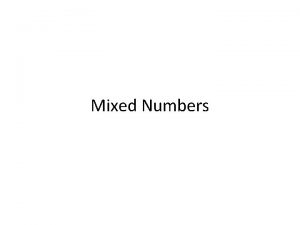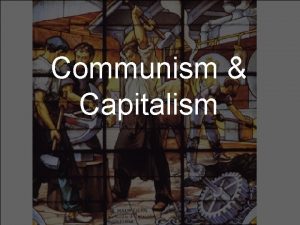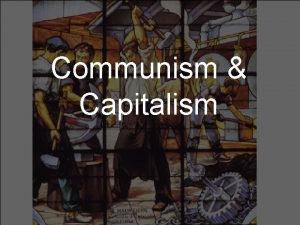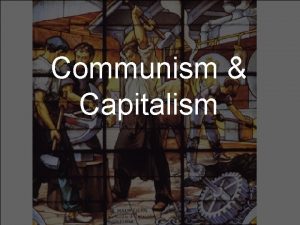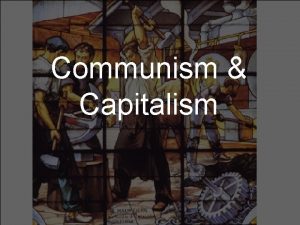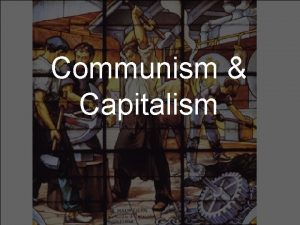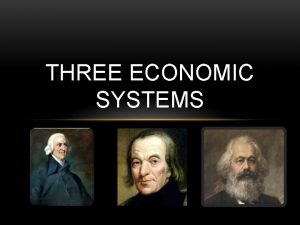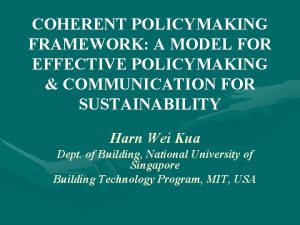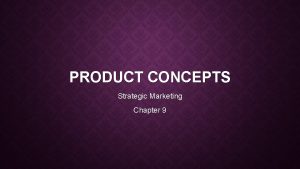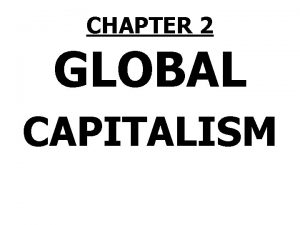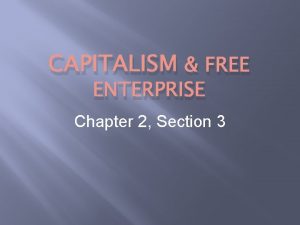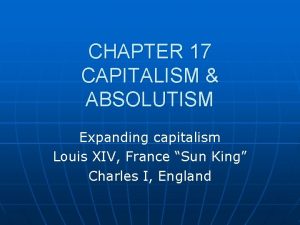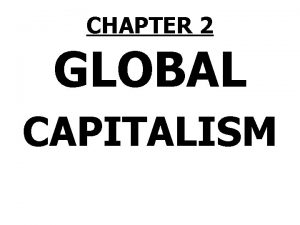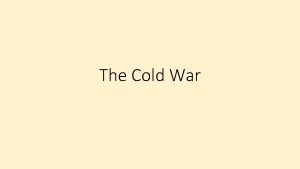Economic Policymaking Chapter 17 Economic Policy Capitalism Mixed































- Slides: 31

Economic Policymaking Chapter 17

Economic Policy • Capitalism • Mixed economy • Laissez-faire

Economic Policy • Measuring unemployment • Underemployed • Inflation and the consumer price index

Economic Policy (Democrats View) • Keynesian Economic Theory is an economic theory named after John Maynard Keynes. He is most well-known for his simple explanation for the cause of the Great Depression. His economic theory was based on a circular flow of money, which refers to the idea that when spending increases in an economy, earnings also increase, which can lead to even more spending and earnings. Keynes' ideas spawned numerous interventionist economic policies during the Great Depression.

Economic Policy • In Keynes' theory, one person's spending goes towards another person's earnings, and when that person spends his or her earnings, he or she is, in effect, supporting another person's earnings. This cycle continues on and helps support a normal, functioning economy. When the Great Depression hit, people's natural reaction was to hoard their money. Under Keynes' theory, this stopped the circular flow of money, keeping the economy at a standstill.

Economic Policy • Keynesian economics warns against the practice of too much saving and not enough consumption, or spending, in an economy. It also supports considerable redistribution of wealth, when needed. Keynesian economics further concludes that there is a pragmatic reason for the massive redistribution of wealth: if the poorer segments of society are given sums of money, they will likely spend it, rather than save it, thus promoting economic growth.

Economic Policy (Republic View) • Supply-side economics is a school of macroeconomics that argues that economic growth can be most effectively created by lowering barriers for people to produce (supply) goods and services as well as invest in capital. • According to supply-side economics, consumers will then benefit from a greater supply of goods and services at lower prices; furthermore, the investment and expansion of businesses will increase the demand for employees. • Typical policy recommendations of supply-side economists are lower marginal tax rates and less regulation.

Other Economic Issues • Protectionism: Economic policy of shielding an economy from imports. • Wagner Act 1935: National Labor Relations Act. Sets rules to protect unions and organizers.

Social Welfare Policy Chapter 18

Social Welfare Policy Social Welfare policies • Entitlement programs (popular) • Means-tested programs (political conflict) Political question: What should people be entitled too?

Social Welfare Policy Income vs Wealth Income: funds collect between any two points in time. Wealth: The value of assets owned. So, what causes the income distribution issues in politics?

Social Welfare Policy Poverty in America Poverty Line ($23, 000 for a family of 4) Feminization of poverty

Social Welfare Policy Taxes in America • Progressive tax • Proportional tax • Regressive tax • Earned income tax credit

Social Welfare Policy Reform: Social Security Act. 1935 Personal Responsibility and Work Reconciliation Act 1996 Temporary Assistance for Needy Families (TANF) 1996

Social Welfare Policy Social Security Trust Fund is in trouble. Bush attempted to fix Social Security overhaul. (often called “privatization”) The world has a much larger “welfare state” than the United States. Europe was dominated by the Welfare State belief until the turn of the century (2000). This has changed as conservatives have had huge success in the past decade there in elections.

Health Care Policy • Uneven Coverage, Uneven Care – Health Insurance • 46 million Americans have no health insurance. • Most common reason for losing health insurance is losing or changing a job • Health insurance is closely tied to race and income—higher income means more likely to have insurance – Managed Care • Health Maintenance Organization (HMO): organization contracted by individuals or insurance companies to provide health care for a yearly fee. • Designed to reduce costs through oversight and limiting patient choices. • Limits choice of health care providers

Health Care Policy • The Role of Government in Health Care • Government in the United States plays smaller role than governments in other countries • National Health Insurance: a compulsory insurance program for all American that would have the government finance citizens’ medical care—not passed • Medicare: provides hospitalization insurance for elderly and optional coverage for other medical expenses • Medicaid: public assistance program to provide health care for the poor, which is funded by both national and state governments

Health Care Policy • Policymaking for Health Care • The Politics of Health Care • Interest groups play a major role in health care policy making, leading to uneven government and private health care policies. • Elderly • Businesses • Insurance companies

Health Care Policy • Policymaking for Health Care • The Health Policy Issues Ahead • Nothing suggests health care will become cheaper. • Stem cell research • Limits on federal funding and research, but states spending more • Is medical rationing the solution to high health care costs?

Environmental Policy • Environmental Protection Agency: A federal agency created in 1970 and charged with administering all the government’s environmental legislation • Administers policies dealing with toxic wastes • The largest independent regulatory agency

Environmental Policy • Clean Air Act of 1970: charged the Department of Transportation with responsibility to reduce automobile emissions • 1990 amendments allowed emissions trading and this has grown into a world product of trading carbon credits

Environmental Policy • Water Pollution Control Act of 1972 • Intended to clean up the nation’s rivers and lakes requiring the use of pollution control technology • Has helped reclaim numerous rivers and lakes since its passage • But misses “runoff” pollution from city streets and other areas

Environmental Policy Environmental Policies in America Wilderness Preservation The U. S. is a world leader. The national parks and national forests may be restricted to keep them for future generations. • George W. Bush proposed letting states decide on roads in wilderness areas. • Endangered Species Act: federal government must protect actively endangered species— regardless of economic impact • •

Environmental Policy • Toxic Wastes • Superfund: created by Congress in 1980 to clean up hazardous waste sites; money comes from taxing chemical products • Has virtually eliminated haphazard dumping of toxic waste, but less successful in cleaning up existing waste • Nuclear waste presents a serious challenge— Yucca Flats in Nevada as home for nuclear waste

National Security • Instruments of Foreign Policy –Military –Economic –Diplomacy

National Security United States as Actors on the World Stage • International Organizations United Nations 1945 • Regional Organizations North Atlantic Treaty Organization 1949 European Union Multinational Corporations Nongovernmental Organizations (Green Peace) Individuals (tourism)

National Security Policymakers • The President • Diplomats (including advisors to the President) • National Security Establishment – President – Secretary of Defense – Joint Chiefs of Staff ( made up of the top leader of each branch of the military) – CIA and FBI – Congress

National Security Policymakers • Nuclear Proliferation • Only a few countries have known nuclear weapon capabilities. • Fear that other “rogue” countries will have nuclear weapons capabilities and use them against their neighbors or the U. S. • The U. S. will focus on discouraging the deployment of developed nuclear weapons.

National Security Policymakers • The International Economy • Interdependency: mutual dependency in which the actions of nations reverberate and affect one another’s economic lifelines • International Trade • Tariffs: a tax on imported goods to raise the price, thereby protecting American businesses and workers • NAFTA and GATT are ways to lower tariffs and increase trade. • Congress approved the Central American-Dominican Republic Free Trade agreement in 2005. • Balance of Trade • Ratio of what is paid for imports to what is earned for exports

National Security Policymakers • Energy • America depends on imported oil, about 60 percent, but not as much as other countries like Japan. • Much of the recoverable oil is in the Middle East which is often the site of military and economic conflicts. • Organization of Petroleum Exporting Countries (OPEC): controls the price of oil and amount its members produce and sell to other nations

National Security Policymakers • Foreign Aid • Foreign aid is used to stabilize nations friendly to the United States. • A substantial percentage of foreign aid is military. • Foreign aid has never been very popular with Americans and is typically cut by Congress.
 The policy making process
The policy making process Capitalist economic system
Capitalist economic system Chapter 3 lesson 1 american free enterprise capitalism
Chapter 3 lesson 1 american free enterprise capitalism Characteristics of mixed economy
Characteristics of mixed economy Mixed economic system
Mixed economic system Laissez faire theory
Laissez faire theory Hitlers economic policy
Hitlers economic policy Economic policy
Economic policy What does holodomor mean
What does holodomor mean Communism and capitalism dbq answer key
Communism and capitalism dbq answer key Mercantilism
Mercantilism Who created this
Who created this Characteristics of capitalism
Characteristics of capitalism Pros and cons of capitalism
Pros and cons of capitalism Reviewing key terms
Reviewing key terms Consumer capitalism
Consumer capitalism Capitalism disadvantages
Capitalism disadvantages Capitalism pros and cons
Capitalism pros and cons Development of capitalism
Development of capitalism Major characteristics of capitalism
Major characteristics of capitalism Rock paper scissors communist game
Rock paper scissors communist game Capitalism ideas
Capitalism ideas Traditional capitalism
Traditional capitalism Mercantilism vs capitalism
Mercantilism vs capitalism Characteristics of capitalism
Characteristics of capitalism An inspector calls character
An inspector calls character Father of capitalism
Father of capitalism How are conflicts among economic goals resolved?
How are conflicts among economic goals resolved? The american free enterprise system lesson 1 answer key
The american free enterprise system lesson 1 answer key The inherent vice of capitalism
The inherent vice of capitalism Global capitalism ppt
Global capitalism ppt High road
High road
